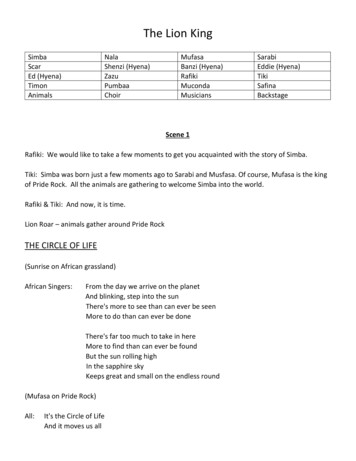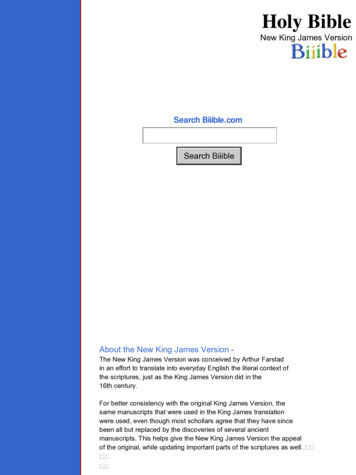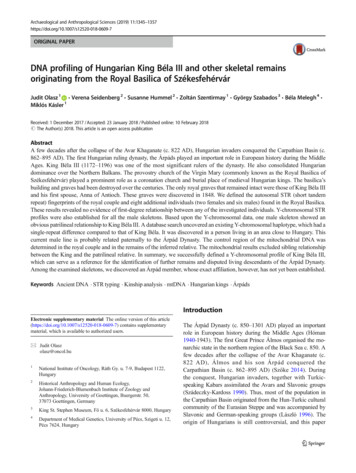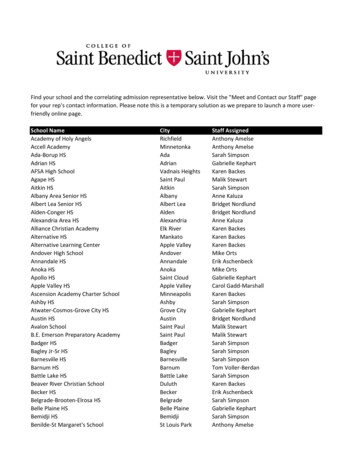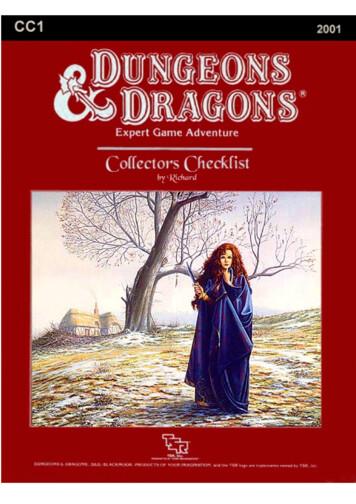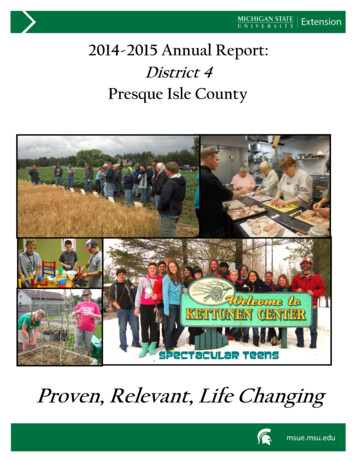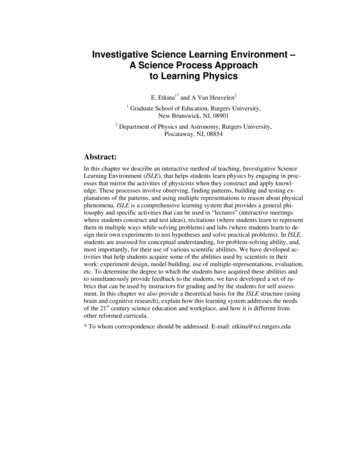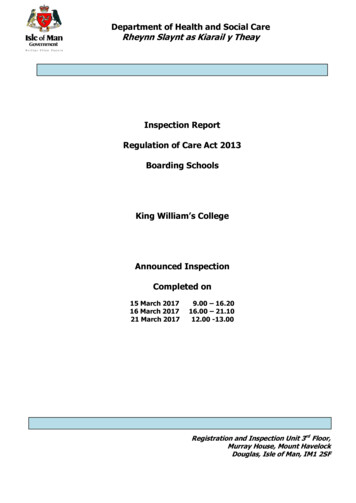
Transcription
Department of Health and Social CareRheynn Slaynt as Kiarail y TheayInspection ReportRegulation of Care Act 2013Boarding SchoolsKing William’s CollegeAnnounced InspectionCompleted on15 March 201716 March 201721 March 20179.00 – 16.2016.00 – 21.1012.00 -13.00Registration and Inspection Unit 3rd Floor,Murray House, Mount HavelockDouglas, Isle of Man, IM1 2SF
ROCA/P/ContentsCompleting and returning your reportTo complete your report form, enter text by clicking on the box see the instructions below.Use the tab key to move to the next box.Provider’s action planAdd details of your actions to complete the requirements/recommendations (if applicable)Provider’s Action PlanClick here to enter text.Provider’s comments/responseConfirm you have read and agree/disagree the contents of the report by clicking on the appropriateboxState any factual inaccuracies found, add comments (if applicable)Sign (type name when returning electronically) and dateReturn your report to randi@gov.im within 4 weeksDo not use any other method e.g. links to Cloud or other file sharing servicesThis report and grades represent our assessment of the quality of the areas of performance whichwere examined during this inspection.Part 1:Service informationPart 2:Descriptors of performancePart 3:Summary of Inspection OutcomesAreas of good practiceQuality improvements subsequent to the previous inspectionAreas for improvementDemeanour of and feedback from service usersPart 4:Inspection Outcomes and Evidence and RequirementsInspectors were mindful of those outcomes noted within Every Child Matters and Isle of ManChildren’s Strategy and measured the home’s compliance against National Minimum Standards forBoarding andardStandard5 Accommodation6 Safety of Boarders7 Fire Safety8 Food and Drink11 Safeguarding14 Management and Development15 Recruitment2
ROCA/P/Standard 16 Staff supervisionStandard 17 ComplaintsPart 5:Previous RequirementsCompliance with requirements and good practice recommendations from previous inspections.Requirements and good practice recommendations identified from this InspectionPart 6:Provider’s comments and response3
ROCA/P/Service InformationName of Service: King William’s CollegeRegistration number ROCA/P/Tel No: (01624) 820400Not applicableAddress Castletown, Isle of Man, IM9 1TPConditions of Registration: Not applicableBrief Description of Service and Services ProvidedKing William’s College is a residential boarding school for both genders aged between 11 and 18years of age. The college has capacity to provide full boarding for up to 120 pupils during term time.Currently boarding is provided on a full time, weekly or flexi basis. The College building is situated inCastletown within substantial grounds incorporating numerous playing fields.Christian values and ethos underpin college life. The College welcomes students from other faiths anddifferent cultures. Young people can achieve academically towards the international baccalaureateThe inspector focused on the boarding provision which is provided in two main houses and twosmaller annexes. School House and the Hundred are being currently used by female boarders whilstColbourne House and Jackson are the accommodation currently used by male boarders.Establishment/Agency InformationEmail Address: principal@kwc.imName of Principal: Joss BuchananType of Establishment: Boarding SchoolDate of latest registration certificate: Not applicableAssessed risk level of service:Pre-inspection: lowPost-inspection: lowDate of any additional regulatory action in the last inspection year (ie improvementmeasures or additional monitoring risk level increases:NoneDate of previous inspection: 15, 16 & 23 & March 2017No of children using the service at the time of the inspection: 110 boardersPerson in charge at the time of the inspection: Stuart CorrieName of Inspector(s): Mandy Quirk & Trina Bradley4
ROCA/P/Descriptors of Performance against StandardsInspection reports will describe how a service has performed in each of the standards inspected.Compliance statements by inspectors will follow the framework as set out below.CompliantArrangements for compliance were demonstrated during the inspection. There are appropriatesystems in place for regular monitoring, review and any necessary revisions to be undertaken. Inmost situations this will result in an area of good practice being identified and comment being made.Recommendations based on best practice, relevant research or recognised sources may be made bythe inspector. They promote current good practice and when adopted by the registered person willserve to enhance quality and service delivery.Substantially compliantArrangements for compliance were demonstrated during the inspection yet some criteria were not yetin place. In most situations this will result in a requirement being made.Partially compliantCompliance could not be demonstrated by the date of the inspection. Appropriate systems for regularmonitoring, review and revision were not yet in place. However, the service could demonstrateacknowledgement of this and a convincing plan for full compliance. In most situations this will resultin requirements being made.Non-compliantCompliance could not be demonstrated by the date of the inspection. This will result in a requirementbeing made.Not assessed5
ROCA/P/Summary of InspectionThis is an overview of what the inspector found at the time of the inspection.The purpose of this inspection was to:Check the service’s levels of compliance with standards and regulations as set out in Part 4.This was a positive inspection and the inspectors were appreciative of the welcome received and thehelp and support offered by boarding staff and boarders throughout the inspection process.Areas of good practice: Stringent social media monitoring systems were found to be in situ A resource file had been developed for staff and prefects, in relation to the emotionalwellbeing of boarders. Areas covered included risk, anxiety, low self-esteem, eatingdisorders and self harm. It was positive to note the increased visibility of the Deputy Head Pastoral within theboarding provision which had been acknowledged by tutors and boarders alike. A range of improvements relating to the health of boarders was noted. These included thepurchase of new equipment, tightening up of systems, improved communication andrecord keeping. There was also a new assessment process to determine whether boardershave the capacity to self-administer medication, plans for a mini medical to be conductedfor all new boarders and an amendment to the joining pack for new boarders to ensurethat full information about boarders’ medical history is provided by parents. A laundry room for use by boarders, offering the opportunity to develop life skills, hadbeen developed. Access to specialist training and development was supported for all boarding staff. There was a focus on increasing the range of activities for boarders.Quality improvements subsequent to the previous inspection: An electrical installations condition report was conducted. A number of actions were identifiedall of which have now been completed. Amendments have been made to the supervision of boarding accommodation toaccommodate request by boarders. Emergency lighting and firefighting equipment checks are now being conducted on a monthlybasis. Work has been undertaken to improve the environment in Colbourne. New sofas have beenpurchased for the lounge, some areas of carpet have been replaced, a new fridge and diningchairs have been provided for the upper sixth kitchen. However work has not yet been fullycompleted. New windows have been installed throughout Colbourne A urinal cover was put in place in the Hundred however this has created further difficultiesand requires further attention.Areas for improvement: An identified area for young male boarders to eat in the boarding house must be created More formal arrangements for the supervision and appraisal of boarding staff must bedeveloped. A dedicated time must be set aside for all boarding staff to meet as a team once per term Boarding tutors in Colbourne must be physically present in the boarding house to providecover for the full designated period.6
ROCA/P/ Additional electrical sockets must be installed or additional USB multi plugs purchased toreduce the number of extension leads in use.Long term, a solution should be considered to address the need for a larger or additionaldedicated study area.Work is required to address issues in the bathroom in the Hundred including condensation,cracked plasterwork, missing tiles, position of the modesty panel, shelving and a review of theurinal coverPeeling paintwork, windows and faulty cooker in the kitchen in the Hundred must beaddressed.All areas of boarding accommodation must have a deep clean, as requiredMinor amendments to the safeguarding policy must be completedDemeanor of, and feedback from boardersThe inspectors met with a group of female boarders and a group of male boarders. They groups weremade up of differing ages and nationalities. Boarders were asked whether they felt safe at KingWilliam’s, all stated that they did feel safe and two boarders even said that they feel safer at theschool than in their own country.Boarders felt that they had a range of people that they could talk to if they needed help, advice orsupport. These included House Mistress and Masters, House Mothers and boarding tutorsThey felt that changes were still needed in relation to Wi-Fi access as it was generally felt that thefirewall restrictions were overly punitive. The Deputy Head pastoral had become aware of this issueand discussed with the inspector his intent to remove all but essential firewalls7
ROCA/P/Regulation of Care Act 2013, Part 2 (37) and Care Services Regulations Part 3 (9)Standard 5 AccommodationOUTCOMEBoarders’ accommodation is suitable for its purpose; is gender specific and hasappropriate facilities. The privacy of boarders is reasonably protected. Any offsiteaccommodation for boarders is fit for purpose.Our decision:Partially compliantReasons for our decisionBoarders are accommodated in houses which are occupied solely by male or female boarders.Colbourne and Jackson are denoted as male boarder accommodation whilst School House and theHundred are currently used by female boarders.In Colbourne work to address issues within the communal areas had begun with the purchase of fournew sofas. The Head of Boarding explained that the remaining sofas are due to be replaced shortly.New carpet had been installed in some areas of the building including the stairs and some bedrooms.There were still some areas outstanding. In the lounge a new projector and Sky television had beeninstalled which was appreciated by boarders. Access was password protected to ensure that nounsuitable content was viewed. A pool table had also been purchased and was awaiting delivery. Inaddition a laundry room had been equipped, with a view to developing the life skills of boarders anda store room had been altered to provide a skype room. This would afford boarders access tocommunication should the Wi-Fi system go down or privacy be required. Repainting of The Head ofBoarding’s office was due to take place over the Easter half term. However in general there were stillareas of Colbourne, such as the lounge, where paintwork needs to be refreshed. The inspectors wereinformed that lighting in the lounge was planned to be improved although no timescale had beenidentified for this work.All boarders have access to a desk for study in their rooms. In addition to which there was adedicated study area, located within the library. However, due to the rise in boarder numbers, thishad become too cramped. Consequently a recent decision was made for younger boarders,supervised by older boarders to use a classroom. The reason being twofold one to alleviateovercrowding and the other to develop leadership skills amongst the older boarders. Moving forward,given there is potential for a further increase in boarder numbers, there is a need to consider alonger term solution to this issue.There were sufficient and suitable toilet, washing and bathing facilities available for the number ofboarders. Provision was separated by gender. In the previous inspection female boarders who nowoccupy the Hundred had requested that the urinals be covered. This was addressed but during thisinspection it was apparent that although they had been covered as requested, the cover appliedresulted in limited access to one of the toilets. This needs further consideration and attention as thework completed was not deemed satisfactory by the inspectors. Further areas requiring attention inthe bathroom in the Hundred were noted including cracked or missing tiles in a toilet, problems withcondensation, observed to be addressed currently through use of a towel to soak up any excess8
ROCA/P/water on a window sill, damp patches on walls and cracks in plasterwork. The location of themodesty panel was also found to be somewhat restrictive and would benefit from being moved backa little. This bathroom would also benefit from some shelving for toiletriesIn School House the condition of the environment has improved over time but there are still areaswhich require attention. The sofas in the communal lounge are now showing signs of wear and tearand must be replaced. There have been changes in relation to access from School House to theHundred with the opening up of a corridor between the two. This needs work to improve thelighting, paintwork and flooring. The kitchen in the Hundred needs attention to the peelingpaintwork, windows and faulty cooker. Bedrooms were noted to be comfortable spaces which hadbeen personalized by boarders.In order to improve access to the onsite theatre a disabled lift will be installed over the Easter period.Boarders’ privacy was appropriately respected and no issues or concerns in this regard wereidentified or raised by boarders themselves.RequirementsStandard 5Colbourne shower temperature regulation to be addressedCooker in the Hundred to be replaced or repairedSofas in School House lounge must be replacedPaintwork in the kitchen and toilets in the Hundred must be refreshedWindows in the kitchen and toilets in the Hundred must be replacedCracked plasterwork in the toilets in the Hundred must be made goodThe modesty board in the toilets in the Hundred must either be removed or positioned slightlyfurther back.The urinal cover provided must be reconsidered due to size and alternative solution found.A solution to the lack of a venue for young male boarders to eat in the boarding house must beidentified.Timescale: October 2017RecommendationA long term solution to the need for an additional bespoke study area should be considered.Provider’s action planRequirementsStandard 5 - Accommodation The Colbourne shower temperatures – individual mixer taps already installed at the time ofwriting 26/06/17.The Cooker in the Hundred – replace or repair – will be done – August 2017.Sofas in School House lounge – replace – will be done – Summer 2017.Paintwork in kitchen and toilets in the Hundred – will be done – August 2017.Windows in kitchen and toilets in the Hundred – will be done – start of September 2017.Cracked plasterwork in toilets in the Hundred – will be repaired – August 2017.Modesty board in the toilets in the Hundred – will be repositioned – August 2017.9
ROCA/P/ Urinal cover in the Hundred – remove cover and urinal completely – August 2017.Venue for young male boarders to eat in the Boarding House – solution already found at the timeof writing – eating area created in student Common Room (26/06/17).Recommendation Additional bespoke study area should be considered – this will be considered in the next academicyear.Regulation of Care Act 2013, Part 2 (37) and Care Services Regulations Part 3 (9)Standard 6 Safety of BoardersOUTCOMEBoarders’ are kept safe whilst using school premisesOur decision:Substantially compliantReasons for our decisionThe school had a detailed health and safety policy in place which covered an extensive range ofareas relevant to the smooth running of the College. The policy was aimed at ensuring the health,safety and wellbeing of boarders and staff members. All new staff members are given a copy of thepolicy to read, understand and implement. Topics covered included Legionella, RIDDOR and COSHHA COSHH data sheet file was found to be maintained.There was a legionella risk assessment and regular monitoring of water supplies within the boardingaccommodation.RIDDOR records are completed, records held in a central file and appropriate parties notified of anyrelevant events.There was a team of maintenance workers on site, who are responsible for ensuring that boardingaccommodation and facilities are maintained to a suitable standard. On occasions where identifiedtasks are outside the capacity or skill base of the maintenance team external contractors are utilised.It was possible to determine that annual testing of all portable electrical appliances had beenundertaken through observation of stickers on plugs which confirmed the date tested.A range of internal and external risk assessments had been completed and were planned for review.These highlighted any risks relating to the environment and any control measures in place tominimise such. Review of these documents was almost due.A full check of the condition of electrical wiring throughout all boarding areas had been conducted bya qualified contractor. This highlighted a number of actions that required attention or wererecommended for attention. The College had gone on to have all such actions addressed by thesame contractor. However the issue of overloading electrical sockets continues. A small number ofmultiple USB charger plugs had been purchased. Additional plugs must be purchased or the numberof electrical sockets increased.10
ROCA/P/A heat exchanger had been installed in School House. This has addressed the problems with watertemperature regulation in the showers. It has been confirmed that this will not address similarproblems regarding shower temperature in Colbourne. An alternative solution had been identifiedand was planned for action during the Easter holiday period.Most windows in the boarding accommodation have now been replaced thereby addressing issuesrelating to damp and draughts.There was a policy regarding alcohol, smoking, drugs and other substance use. This offered guidanceto boarding staff for dealing with any such situation which may arise. The policy noted that the focusis on educating boarders, helping them understand the dangers associated with alcohol, smoking orsubstance use, seeking to promote prevention. The policy clearly covered what was and what wasnot acceptable including any potential sanctions that may be applied linked to the level of the breachand offered useful links to further information.The intruder alarm installed in Colbourne has now been activated and is in operation from eleveno’clock at night until seven o’clock the next morning.Feedback relating to the cleaning of boarding accommodation was positive in relation to the day today tasks. However it was felt that deep cleaning during closure times did not happen in areas suchas the games room in Colbourne. It was felt by some boarding staff that despite there being a teamof cleaning staff in situ times and periods when the school was closed, the priority for action was theschool buildings, as opposed to the boarding accommodation.RequirementsStandard 6.5Work must be conducted to address overloaded electrical socketsTimescale: March 2018Standard 6.2All areas of boarding accommodation must have a deep clean, as required.Timescale: 1 September 2017Provider’s action planStandard 6.3 - Safety of Boarders Additional electrical sockets, together with inbuilt USB chargers are continuing to be installed on arolling programme.Standard 6.2 All areas of boarding accommodation must have a deep clean – this will be done annually, andinitially in August 2017.11
ROCA/P/Regulation of Care Act 2013, Part 2 (37) and Care Services Regulations Part 3 (9)Standard 7 Fire SafetyOUTCOMEThe school takes steps to ensure boarders are not at risk from fire and that eachindividual knows about and understands the fire procedures.Our decision:CompliantReasons for our decisionFire safety records were examined and the following were found to be in place and up to date:Fire risk assessmentFire safety policyFire evacuation procedureAppropriate signageMonthly emergency lighting checksMonthly fire equipment checksWeekly fire alarm checksFire drillsAnnual fire extinguisher serviceAnnual emergency lighting serviceProvision of specialist fire alarm equipment ,where requiredFire safety training for all staffFire extinguisher trainingBoarders spoken to during the inspection were aware of what to do in the event of a fire andconfirmed that they have been involved in fire drills in the boarding accommodation, outside ofschool hours. They stated that there are fire alarms in every room which are very loud when they gooff and cannot be ignored. All were confident about what to do in the event of a fire.Discussion with the Deputy Head Pastoral evidenced further commitment towards fire safety. He hadmade links with the fire service with a view to conducting exercises designed to test whether thedesignated fire procedures worked, aside from periodic fire drills.Requirements and recommendationsNoneProvider’s action planNot applicableRegulation of Care Act 2013, Part 2 (37) and Care Services Regulations Part 3 (9)Standard 8 Food and DrinkOUTCOMEAll boarders, including those with special dietary, medical or religious needs areprovidedwith meals/or the means to cook meals that are adequate in nutrition, quantity, quality,variety and choice. They are offered a variety of drinks in quantities necessary for goodhealth. Food preparation areas comply with relevant legislation.Our decision:Compliant12
ROCA/P/Reasons for our decisionThe kitchen at the college was found to be appropriately registered with Environmental Health; withwhom they had developed a positive working relationship. There were detailed work schedules inplace to ensure that good hygiene levels had been maintained. In addition to this staff memberswere found to be suitably trained thus ensuring that any potential risks associated with foodpreparation had been minimised.There was also good understanding in relation to responsibilities associated with the fourteen foodallergens. Appropriate records were maintained and notices appropriately displayed.Food hygiene training has been arranged for all staff. As boarders have access to kitchen facilitiesand are able to purchase, store and prepare meals and snacks, it is planned that the housemotherswill advise boarders around food hygiene issues, once they have completed their training.Boarders have access to a menu which changes each term. Examination of the menus, found thatthe content was nutritious, well balanced, available in sufficient quantity and variety to offer hot andcold options to meet a range of tastes. Meals are produced fresh daily and served by trained cateringstaff who follow good food hygiene guidelines. Catering staff had been informed of any dietary,health or cultural needs of boarders and arrangements are made to ensure such needs areaddressed.Food committee meetings are held once per term, with minutes maintained. The attendees consist ofboarders, the domestic bursar and house mothers. This gives boarders regular opportunities tocomment upon and affect change regarding the compilation of the menus.Feedback from boarders indicated that overall they were happy with the food provided. In fact it wasstated that improvements had been noted in the overall menu and boarders were particularlyimpressed with the extended salad and wraps bar. However a few individual niggles were mentionedto the inspectors and some female boarders felt that the range of provisions available for snacks andmeal preparation had reduced. Boarders have the ability to raise any such views in the foodcommittee meetings either personally or through a representative.Requirements and recommendationsNoneProvider’s action planNot applicableRegulation of Care Act 2013, Part 2 (37) and Care Services Regulations Part 3 (9)Standard 11 - SafeguardingOUTCOMEArrangements are made to protect boarders from any form of abuse and bullying.Policies and procedures are consistent with the Isle of Man Protection Children Boardandwith these standards.Our decision:Partially compliant13
ROCA/P/Reasons for our decisionThe inspector met with the Deputy Head Pastoral who is the designated safeguarding lead within thecollege and has two named deputies for this role. He explained that safeguarding matters were takenvery seriously. Records showed that boarding staff attended safeguarding training and refreshertraining.The safeguarding policy was found to contain advice and guidance for staff members to support theirknowledge and understanding of what constitutes abuse and what to do if they have anysafeguarding concerns. The policy had been reviewed since the last inspection however there were afew minor amendments still required. The Protecting Children Board is now known as theSafeguarding Children Board (SCB) and the Isle of Man Protecting Children Board policy andprocedures 2012 have been revised and are known as the Isle of Man Safeguarding Children BoardInter Agency Child Protection Procedures 2016. The policy also refers to the Head of Senior Schoolas the designated safeguarding lead. However this post no longer exists and the safeguarding lead isthe Deputy Head Pastoral as mentioned previously.There was evidence that the systems and processes in place for handling any safeguarding concernsand the manner in which they are investigated are supportive of boarders’ welfare; with appropriaterecords maintained.In line with the need to safeguard boarders, a new mobile phone use policy had been introducedwhich focused particular emphasis on the use of social media, sexting and privacy laws.The safeguarding policy determined that the safeguarding committee must meet each term to ensurethat all aspects of boarding are reviewed from a safeguarding perspective. Minutes of these meetingswere not examined during this inspection.The college also has a designated governor for child protection and the principal has to produce anannual safeguarding report for the governing body.In addition the college has a full time social media staff member, whose role it is to promote andmanage all social media input from boarders in order to enable boarders to access social mediasafely and protect them from uploading any inappropriate material or comments. Any concernswould be raised with boarding staff, during meetings held every couple of weeks. Monitoring of allsocial media is constant.Recently all boarding tutors were issued with a small wallet sized card as easy access safeguardingreference tool. In addition to this all boarders were given a small card, encouraging them to lookafter their emotional wellbeing, offering contact details for useful people and websites.Training in child safeguarding is attended by all staff members updated on a regular basis.Boarders were noted to be the responsibility of an identified boarding staff member and supervisedappropriately at all times, evidence of which can be demonstrated through the duty rotas. There aresystems in place for any boarder to follow when leaving the school site.Physical intervention had not used in the school but there was a policy in place for guidance shouldthis be required. The policy was clear that physical intervention was only to be used in the event of aboarder being in danger of harming themselves or others. The policy states that any use of physicalrestraint must be appropriately recorded.The issue of bullying had been identified as important and an anti-bullying policy was in place.14
ROCA/P/Feedback gathered from staff and boarders indicated that there were no issues in this regardcurrently. Evidence gathered indicated that relationships between boarders were positive.The school had a whistleblowing policy document, the content of which sought to develop a culturewhere staff members feel comfortable to raise any concerns, without fear of retribution. However thepolicy did not have an identified review date and did not contain any contact details for externalagencies concerned with the protection of children.There was also a policy in relation to children going missing which offered staff guidance for dealingwith such an incident. Instructions for boarding staff were also contained within the tutors handbook.Any such incidents must be reported to the Registration and Inspection unit, however this was notnoted in the policy. The policy had a date of completion but no review date was identified. Therehave been no incidents notified since the last inspection.RequirementsStandard 11.1The minor amendments to the safeguarding policy must be completed.Timescale: 16/06/17StandardThe whistleblowing policy must be reviewed and updatedTimescale: 30 August 2017StandardThe missing children policy must be amendedTimescale: 30 August 2017Provider’s action planRequirements: Safeguarding Policy (including Whistleblowing Policy) reviewed, updated, signed off bygoverning body and uploaded to website (26/06/17). Missing Student Policy updated, amended andchecked by Social Care (31/05/2017).Regulation of Care Act 2013, Part 2 (37) and Care Services Regulations Part 3 (9)Standard 14 Management and DevelopmentOUTCOMEThere is a clear leadership of boarding in the School. Effective quality assurancemethods are in place.Our decision:Substantially compliantReasons for our decisionThere are clear struct
King William's College is a residential boarding school for both genders aged between 11 and 18 years of age. The college has capacity to provide full boarding for up to 120 pupils during term time. Currently boarding is provided on a full time, weekly or flexi basis. The College building is situated in
